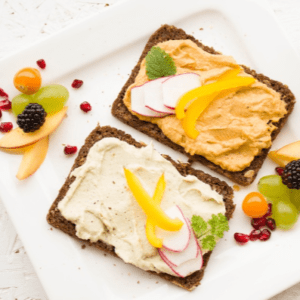
Fortunately, there are some simple ways to make food more nutritious without sacrificing taste or convenience. From adding healthy fats and proteins to using fresh ingredients instead of canned ones, here are several easy tips for making your meals healthier and more nutrient-rich.
Include Healthy Fats and Proteins
Healthy fats and proteins can be included in nutritious meals in many different ways. Adding a few tablespoons of olive oil or nut butter will provide the body with essential fatty acids, while seafood such as salmon, mackerel, and tuna, offer plenty of omega-3s.
Eating lean meats like chicken, pork, and turkey also provides protein to fuel the body. Eggs are another great source of protein and healthy fats, as are nuts, seeds, and legumes.
Additionally, adding plant-based proteins to meals is an excellent way to make food more nutritious—tofu, edamame, and tempeh are some of the most popular choices for vegetarians and vegans.
Finally, adding healthy fats and proteins helps keep you feeling fuller longer as they take more energy to digest. This helps reduce the chances of overeating, which can lead to weight gain if not managed correctly. As a bonus, these foods are also packed with vitamins and minerals that benefit the body in numerous ways.
Take Advantage of Peptides
These are small molecules that can provide the body with additional health benefits—they can help improve cell signaling, reduce inflammation, and enhance immunity by fighting disease-causing bacteria or viruses. Some of the most common peptides found in food include whey protein, collagen, and glutamine.
Additionally, foods like mushrooms and oats contain plant-based ones, making them an excellent choice for vegetarians and vegans.
However, you can add synthetic peptides to your meals too. Synthetic peptides, such as branched-chain amino acids (BCAAs), can be found in powders and capsules, making them a convenient way to get additional health benefits without having to change up your diet too much. Other popular synthetic molecules include creatine, beta-alanine, and citrulline.
Focus on Fresh Ingredients
Processed and pre-packaged foods are usually lacking in key vitamins and minerals that are essential for optimal health. Instead of resorting to these convenient but nutritionally empty meals, opt for fresh ingredients whenever possible. This means buying fruits, vegetables, nuts, and seeds from the grocery store or farmers’ market rather than canned or frozen items.
Fresh ingredients are also typically lower in sodium, sugar, and preservatives than their processed counterparts.
Additionally, when preparing meals with fresh ingredients, you can control the amount of fat and salt that goes into them, allowing you to adjust seasonings according to your taste and dietary needs.
Incorporate Superfoods
Superfoods are nutrient-dense foods with high levels of antioxidants, vitamins, minerals, and other beneficial compounds. Some of the most popular superfoods include kale, blueberries, salmon, quinoa, chia seeds, and acai berries—all of which can be easily added to salads, smoothies, soups, oatmeal, or yogurt bowls. Not only do these foods provide a variety of health benefits, but they also add flavor and texture to meals, making them more enjoyable.
Other less common but equally nutritious superfoods include spirulina, maca powder, cacao nibs, and hemp seeds. Incorporating these into your diet can help boost nutrient intake while avoiding the potential excess calories that come with processed foods.
Go for Whole Grains
Whole grains include options like oats, quinoa, barley, buckwheat, brown rice, bulgur wheat, rye, millet—the list goes on. These grains can be used as a base for salads or soups or added to smoothies for an extra boost of healthful nutrients.
As you can see, by incorporating superfoods into your meals and opting for fresh ingredients whenever possible, you can easily boost the nutritional content of any dish. Additionally, adding healthy fats and proteins helps keep you feeling fuller longer while providing numerous health benefits.
Peptides provide additional health benefits that help reduce inflammation, improve cell signaling, and enhance immunity. Finally, choosing whole grain alternatives over refined grains like white flour and rice can also increase nutrient intake while avoiding excess calories from processed foods.
With these tips in mind, it should be easy to incorporate more nutrition into your diet!